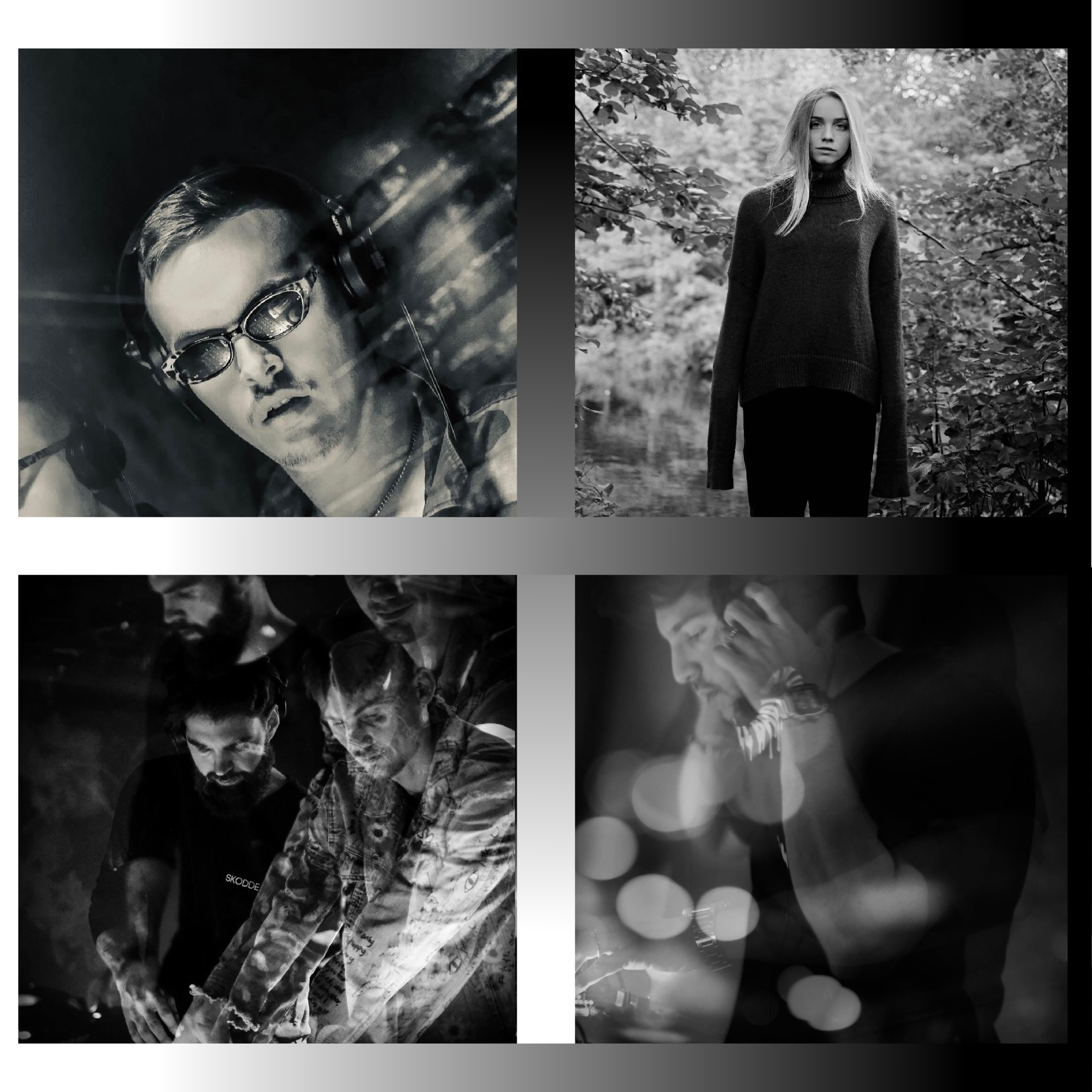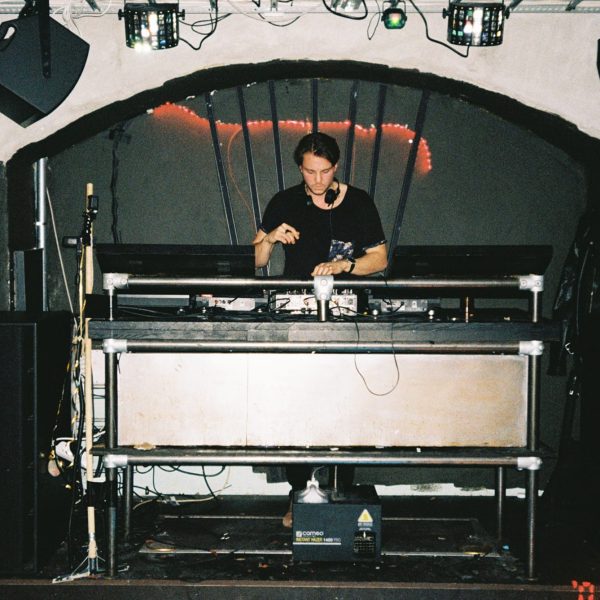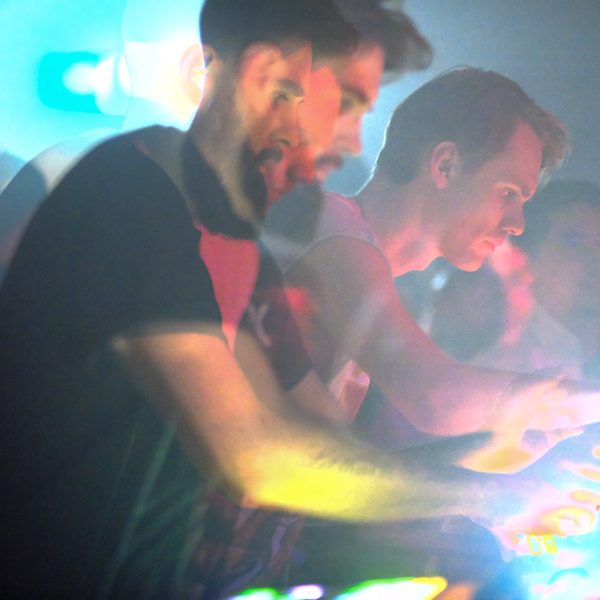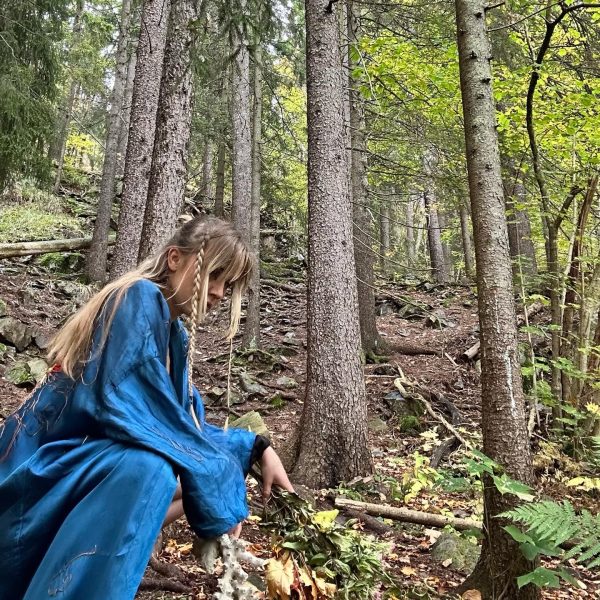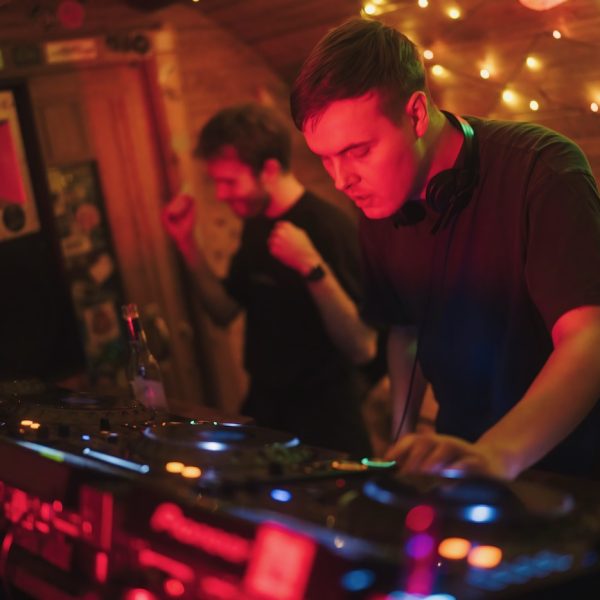Part two of our roundtable conversation with the Flux Collective talking about and looking toward the future of the scene ahead of their event this Friday.
In a mere 2 years, Flux Collective has established a profile in Oslo’s club community that rivals even some of the most established Techno concepts around. Going from the forests in summer to the clubs in winter, they’ve garnered a dedicated following in Oslo’s clubbing community, which is starting to reach tendrils in the rest of Europe carried on the wings of the label.
Aside from their own solo efforts as DJs, artists and live performers, each member of the collective takes on specific roles within the organisation, which runs more like an enterprise than a community. It culminates in a multi-layered approach that covers each aspect of club culture and is currently looking towards new avenues that will take them into more abstract regions.
Last week, we talked to them about their origins, their thoughts on the Techno scene and more. In part 2 of our extensive Q&A we cover the future possibilities of the collective; their move from Oslo’s forests to the clubs; and how a pandemic opened up the floodgates for this new scene. They’ll be releasing Metamorphosis n this week to celebrate 2 years of Flux, with a dedicated event in our basement to mark the occasion.
Mischa Mathys: Andrea, you mentioned something earlier about the explosion of Techno. That concurs because what people were calling Techno here was essentially Tech House in my opinion and then suddenly there was this huge demand. Before that there was maybe Void and a few very niche DIY concepts doing this kind of sound, but then suddenly exploded. What do you guys think was the catalyst for that in Norway?
Andrea (Anémi): I just think that Norway has been hanging behind. Techno was a new thing for many and people were excited about it because the scene has been made mainly around minimal, or Tech House. The new kind of sounds that arose really had younger people talking about it.
During the pandemic everybody was feeling suppressed. A lot of young people, especially the people who hadn’t been able to go out in the clubs, even though they had come of age, had been angry and disconnected. I feel that’s why Techno flourished, because it’s these people playing underground music and making home raves or home parties.
Henrik (Skodde): Because so many new people were discovering underground music and just calling it Techno. I was playing every favourite I had as a child. So we can play Techno, Hard Trance, and Trance. Nobody cares but everybody cares, because people are very accepting. Not right now, but at the beginning.
Andreas (Skodde): One thing that’s really cool about the Oslo Techno scene right now – and we have a lot of communication from outside of Norway– the scene is different because if you host a party in Berlin, it’s only one sound the whole night. In Oslo you can get Breakbeat, hard Techno, Psytrance, Ghettotech; you can get everything in one night. The Oslo scene is completely different from anywhere else in the world right now, because of the forest raves. A lot of the DJ’s don’t even know about these big artists, they just know what’s going on in Oslo.
David (Bjerregaard): I have an idea and it has to do with politics. If we look at the rest of Europe, especially central Europe, Norway is very conservative when it comes to partying. We have a lot of rules and we have very strict rules regarding drugs as well. For a long time Techno and the whole scene was frowned upon by clubs because they didn’t really dare host these kinds of parties; because they would get a lot of pressure from authorities.
Mischa: Yes I remember a stint here at Jaeger where we couldn’t even promote a night as a Techno night.
David: But I’d say that in the last five to ten years the cops are also much more lenient. It’s more liberalised with taks of legalisation and so on. So that combined with the covid shutdown, reset the attitude to a lot of people who run the clubs. They saw there’s a huge demand for this kind of music, so it became a renaissance for this music.
Gaute (Naboklage): But why is there such a demand for this music?
David: Well, there was always a demand. It was gate kept and then it was shut down for a year and a half. And then after that, they were like, “okay, let’s give it a shot” because they kind of forgot how it was. I had never been to a Techno party in Oslo before covid. I’m sure they existed but to me it was completely unknown.
Gaute: People keep telling me that we had parties before. I never saw it. People would say, don’t think you’re doing anything new.
Mischa: People in your age group?
Gaute: No older people and they’re like, “oh you think you guys are doing something new we had parties before.” You probably did, but not at the same scale. They didn’t have 500 people.
Skodde – the young people, who were not used to clubs, were so free at the raves and suddenly they came into the club and if you were dancing too hard or had your shirt off someone would tell you, you can’t do that.
Andreas: Henrik and I have been in the Techno scene for 10 years. We were in a friend group where everyone listened to Techno before covid. We went to Berlin, we went to Amsterdam, we did all these things because there was nothing happening here… And when there was nothing else happening, the forest raves happened. The people came to the forest and did the thing. There’s a reason why people like Techno and listen to it and when you go to a Techno party a certain amount of time because that’s the only place you can meet friends, of course you’re going to enjoy it.
Gaute: A lot of people who hadn’t gone to Techno things before, went to it and they were exposed to something new. For Norwegian people if there’s something that’s a little bit different their default thing is just to be like, “no, this is weird.” But because of this lockdown, people allowed themselves to be more open-minded and then at some point it became trendy.
Henrik: Because the raves were the only opportunity to go to a party, people actually got to experience or rave music, in the way it’s supposed to be listened to, not through a set of headphones.
Gaute: At the same time if a 20 something kid and his friend just throws a party, they really can play whatever they want, but if you play a DJ gig at a club, there’s a lot more expectation. There’s this very rigid structure for what you do and what you play in this time slot and if you fuck up, there are no more club gigs.
So you have this incentive to conform to whatever they’re already doing at a club. Whereas if you’re just throwing a party with a friend for fun during covid, then you’re like “ok fuck it, let’s just play whatever.” You can play for as long as you want, and you can do whatever you want. This allows people to experiment and do a lot of fun stuff that never would have happened in a club and this kind of opened Pandora’s box.
Everybody groans in agreement.
Mischa: Going from the raves to the clubs as a concept, what have been some of the biggest challenges?
Gaute: The crowd is really different.
Andreas: It’s really the bouncers.
Gaute: Also the opening times. It’s so hard with the people arriving at the club, a bit before 1am and then they leave around 2am. Maybe they stay until three. You have two and a half hours, whereas for a rave you have eight hours of curated music.
Andreas: Also our crowd doesn’t like clubs actually. That’s the hardest part because the young people, who were not used to clubs, were so free at the raves and suddenly they came into the club and if you were dancing too hard or had your shirt off someone would tell you, you can’t do that.
Mischa: So getting your people to the club is not going to be easy, right, so, how do you motivate them?
Gaute: There are limits to what we can do, but we do what we can with what we have. Something I’m really upset about is that Norwegian music events are all funded through alcohol sales. If your music isn’t inclined to sell alcohol then it’s a lot more difficult to do events at nightclubs.
Andreas: That’s actually why we’ve moved more and more towards Jaeger and ditched a lot of the other clubs. I really like the vision of Ola because he’s really into the music.
Mischa: You guys are still doing the raves on top of this, so why do the clubs at all.
Gaute: The logistics are extreme; It’s like doing a 30 hour shift.
David: It’s weather dependent… Because you can’t do it in winter. And it becomes a little watered down if you do it every two weeks in the summer. There’s no way we’re able to do it anyway.
Gaute: … and there’s the police and there’s a bunch of idiots doing drugs. If you have 150 people, close people that you know can behave, then it’s fine. But once it’s 500 to 1000 people, then the odds of one person doing something stupid is quite high. It’s really frustrating because if we were allowed to set up the infrastructure to do it in a responsible way, then we would. We have to keep everything super low key. If we ideally could communicate with the police and maybe an ambulance or something, but you can’t do that because then they’ll just shut you down.
Andreas: We also want to do things as legal as possible.
Gaute: Because we want to run a label and we want to live off of music and then you can’t just do illegal shit.
Mischa: Is that something that could still be realistically achieved in the current music climate, living off music, especially as a collective?
Andrea: I think it has to be a combination of different things. We have some interesting ideas on how we want to go forward with Flux. The label has been doing well but it will take some years to get it all around.
David: And the parties fund the label basically.
Gaute: We do a lot of stuff for free if not everything.
Andreas: We only got 3000 NOK each this year. You can’t bet everything on one horse. You need to do several things and that was our vision from the start.
David: We basically don’t take out any fees from our own parties and we spend everything to either make better parties or to book artists, to build our network of connections. For instance, we took some of the people that we had here (Jaeger) this summer, to the forests. Then the rest goes into the label.
Mischa: So, you are trying to start a community outside Norway as well?
Gaute: We want to export the Oslo scene to the world.
Andrea: And it’s happened naturally because of the label; the people whose music we released, are the people we’ve been talking to and invited to our parties.
Gaute: They’ve played our stuff at the famous German club.
Mischa: How do you find out the artists that land on the label, especially outside of the collective.
Andrea: You just have to be a big nerd. I just have a radar and pick up on what’s around.
Mischa: Do you specifically look for anything in terms of a sound, and do they have to represent something like a Flux sound for you?
Andrea: I have some plans for the next few releases. We actually have been releasing quite a lot for just being able for two years and we have released a lot of Oslo-based artists, because we wanted to support local artists. From that our sound has just been growing, but we are going to have fewer releases and more curated releases.
So we are putting more effort in the production. At the start, it was more like, “oh, I like you, you should release on our label.” Haha. This was so cool though and I am happy for all the releases we have had with all these amazing people. We have evolved a lot since then though and I am excited to work on new curated releases. We have a lot of attention in Europe actually and all around the world, which is really cool, being a small label.
Anemi – We want to take people through a journey, also on a deeper level.
Mischa: Is there a confluence between the artists on the labels and the ones you book for the events?
Andrea: Hmm, we have booked artists we wanted to collab with and artists who already have released music with us, but it doesn’t always have to be an agenda with them. It’s just that we dig their music and their persona somehow.
And originally we were going to do a lot more art, but it’s coming next year. We’ll be doing more events focused on visual- and conceptual art.
Andreas: We want to work with modern art and experimental visual exhibitions with light and sound.
Gaute: An audio visual space for events, where it’s not just blasting music with a strobe, but more like an installation; a whole production.
Andrea: We want to take people through a journey, also on a deeper level.
Henrik: This is really important to do here in Oslo, because of the short opening hours clubs and we’d like to not just play the night shift every week but build an experience.
Andrea: We’ve just been doing so much, playing every weekend and we have just been growing steadily towards the thing we actually want to do; which is the combination of a lot of things.
Mischa: Do you think that after the pandemic and after you set your own standard in the scene that there’s a lot more people coming up, copying your formula
Andreas: Yes. I think it’s a compliment
Gaute: I want people to come to our parties and be like, “fuck, I could do this better” and then I want to go to their event and be like “shit, this is better, we have to be better”. If they play the exact same songs and do the exact same thing, that’s pretty lame, but if they do something different but better then that’s amazing. We should inspire each other to improve our own unique things.
Andreas: Because we have the connections with the clubs and the bookings, we have actually helped a lot of the competition getting into the clubs.
Andrea: Flux has always Invited a newcomers and up and coming artists and will continue to.
Henrik: I do feel there are more different collectives and more concepts under the umbrella of Techno music now than there used to be for House music, just three or four years ago.
Andreas: The scene supports each other much more. Even people I thought didn’t like us, when I get to talk to them, they do and vice versa. The Techno scene in Oslo is really kind of nice to each other and supportive.

